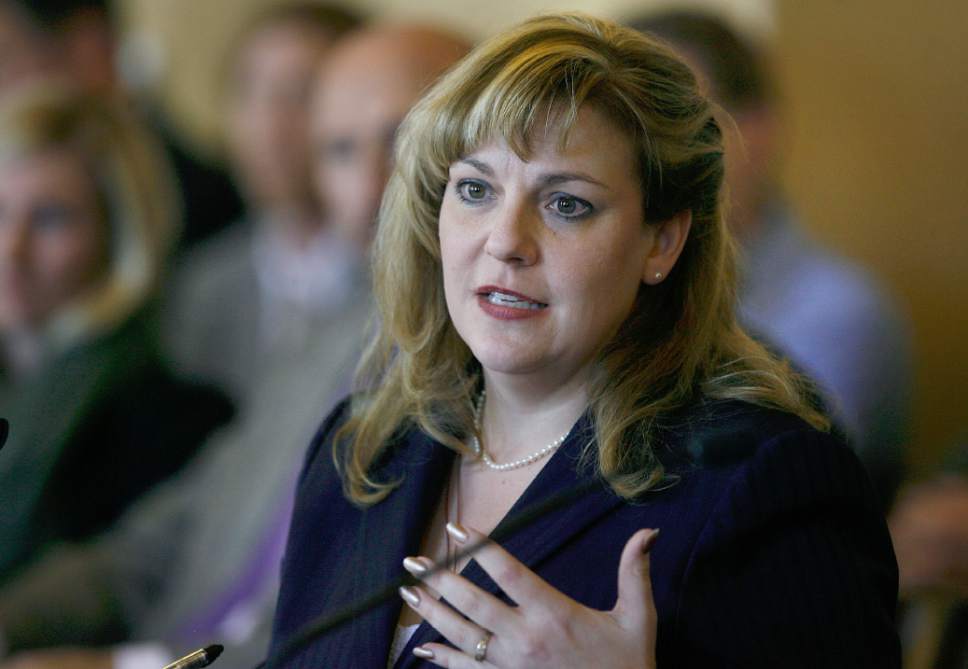This is an archived article that was published on sltrib.com in 2017, and information in the article may be outdated. It is provided only for personal research purposes and may not be reprinted.
The numbers aren't getting better for Utah women in the workplace.
Utah women earn 71 cents for every dollar a man makes doing comparable work, the same as two years ago.
That's the third-biggest disparity in the country, mirrored by North Dakota and West Virginia, and exceeded only by the pay deficits facing women in Wyoming (36 cents less per dollar than men) and Louisiana (32 cents less).
"Utah women lose a combined total of more than $7.3 billion every year," said Debra Ness, president of the National Partnership for Women and Families.
Her group released figures for all 50 states and the District of Columbia on Tuesday, known as Equal Pay Day, to emphasize that "women must work more than three months into this year to catch up with what men are paid."
The report calculated that the median annual pay in Utah for a woman holding a full-time, year-round job was $36,060, compared to $50,741 for a similarly employed man.
Women of color are even worse off. The report said Latina women are paid 47 cents compared to every dollar paid to white, non-Hispanic men. African-American women make 52 comparative cents, it added, and Asian women make 69 cents per dollar.
"If the gap were closed," Ness said, "Utah women could afford to buy food for nearly two more years, 10-plus additional months of mortgage payments, nearly 16 more months of rent or 24.6 more months of child care annually."
The inequities are nothing new to Utah women who have been advocating for greater equilibrium for years.
Shauna Scott-Bellaccomo, whose varied responsibilities include being president of the Women's State Legislative Council of Utah, has been organizing an "Unhappy Hour" for the past three years. Gracie's pub in downtown Salt Lake City served the drinks Tuesday.
Being near the bottom of the pay-inequity list is bad for Utah's reputation, Scott-Bellaccomo said, but it's also damaging to the state's performance. And it can only be righted with changes to the state's predominant Mormon culture, she added.
"Women are not respected for their opinions, and, obviously, for the work they do," she said. "That can be changed through getting an education, getting good jobs and delaying marriage."
Scott-Bellaccomo said the "Unhappy Hour" allows veterans like herself to help newcomers become involved in advancing the cause, working with groups such as the state Women in the Economy Commission, created in 2014 by the late Republican Becky Lockhart, then-speaker of the Utah House, and then-Democratic Rep. Jennifer Seelig.
The commission is researching issues related to women's current and future roles in the economy and to recommend ways to "respond to the rights, needs and impact of women."
To Scott-Bellaccomo, the only way to do so is to reject "those long-held cultural beliefs that women should be in the home, that more emphasis is placed on marriage than education."
Seelig no longer is in the Legislature, but her belief in the need to narrow the pay gap has gathered strength in her role as director of community empowerment for Salt Lake City.
"It's not only an inequity and fairness issue, it's about being competitive in the nation," she said. "We need to be able to tap into all of our skills, talents and abilities," and that cannot happen if half the population is discouraged from working by low wages that cannot keep pace, for instance, with child care costs for a working parent.
"We need to give families full choices and give everyone a chance to compete in a meaningful way in the marketplace," Seelig said.
Catherine Kanter, a longtime advocate on this issue who ran unsuccessfully last fall for a Salt Lake County Council seat, was disappointed that two equal-pay bills didn't get much of a hearing from the Legislature last session despite the state's woeful numbers.
"We're at the bottom of the barrel on this," she said. "It's a condition that's fundamentally unfair and critically important when you consider how many heads of households are women, especially in impoverished families. We need to break the harmful effects of pay discrimination."



